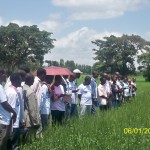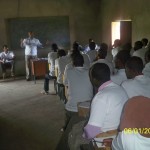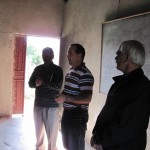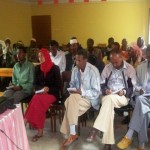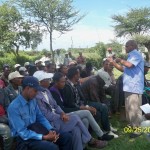In some areas of Ethiopia, there is not a lot of rainfall, even in the “wet” season. In 2009 when the local people in these areas planted several of their crop varieties, during the wet season, very little was actually harvested. Their crops simply could not tolerate the drought conditions. They have had a lot of crop failure in these dry areas in the last two or three years. These drought-prone areas are part of the reason that Morrell Agro Industries’ dry farming project was introduced in the country.
By planting dry farm crops in their normal wet season, that in reality doesn’t receive a lot of rain, locals will be given a crop that they can actually harvest. There is a lot of hope that this project, with the determination of those involved, will go a long way towards famine relief in Ethiopia.
MAI has begun a project in the drought-prone area of Langano, in Ethiopia. It is one of the very dry areas of the country, where most crops will simply not thrive. Two drought-tolerant barely varieties from Utah State University have been introduced there by MAI, and they have grown quite well in the dry conditions.
Evan Maxfield, an agronomist for MAI, is heading up the planting efforts in Langano. In June of 2010, 200 hectares, or about 500 acres, of land will be planted in this area. Containers full of US dry land varieties of barley and wheat are in the process of being shipped to Ethiopia for planting in their wettest season.
Maxfield and other American employees are also planning and in the process of developing a training guide for the Ethiopian staff of MAI. This guide will help to train Ethiopian farmers in modern crop planting methods and proper food crop care.
A important project for Morrell Agro Industries was the development of a training manual for farmers in Ethiopia, especially those in the Langano area. The manual provides details for growing and harvesting wheat and barley in a successful manner, including proper planting depth, soil, fertilizer use, and weed control.
Several people contributed to the training manual. Evan Maxfield was in charge of the planting guide, detailing seed population and planting depths, which are both very important concepts for the local farmers to understand.
Lloyd Ward recommended fertilizer amounts. Fertilizer urea and diammonium phosphate are the only two fertilizers currently in use in Ethiopia. It has been a struggle to recommend specific amounts; even in the United States there is not a hard set amount. Too little or too much nitrogen can negatively effect crops, and variables of rain, climate, soil, and farming practices all had to be taken into consideration. Lloyd wanted to go with a range, linked with desired production, for the pounds of nitrogen to apply per acre. He developed a formula and created a chart that was included in the training manual.
Mike Rhodes developed a weed control guide. Originally, this was going to include suggestions for weed spraying, but it was decided that a hands-on approach would be better, where the farmers go out and pull the weeds. It is a goal to help the farmers understand that weeds are thieves in the fields, stealing nutrients and moisture from the crops. They have the labor and the time to control the weeds better, but they don’t realize how much weeds affect crop yield.
The manual has been completed and farmers in Langano are now in the process of growing MAI seeds. This is basically done by private interest, and participating farmers are growing the seeds on their personal farms. They are experimenting with the MAI seeds this year to see if they grow better than their local seeds.
Mekonen successfully headed the first step in the training initiative. Training participants included 16 local leaders, 16 local development workers, 16 local managers, four district-level agronomists and five supervisors. All participants are supporters to select model farmers and follow up on the farmers’ cultivating practices. Phase two of the training will be at a local level.
This training was very successful with the help of all Arsi Negele MAI staff members and Kokosa Derictore participants. MAI is looking forward to expanding to other areas.
While Evan Maxfield was in Ethiopia in November 2010 he did some training with the farmers in Langano and with the Foresight Fathers group in Kersa. Each of these groups had at least 45 individuals. Training was given on soil management and fertility for growing crops. The farmers were taught how to apply fertilizer to their crops and how much to use. Evan also wanted to be sure that their soil would be healthy enough to sustain plant growth, and he determined that it was.
Evan said that the training went well. All of the farmers have been planting and harvesting MAI’s Jefferson wheat. It was decided that Jefferson performed better when planted later in the year, so it didn’t receive as much rain. This particular variety of wheat grows better with less rain than other varieties.
The local Ethiopian farmers working with MAI have been able to accomplish some good things in their area, and they want to continue to use MAI grain varieties. Evan noted that the people were upbeat about the progress as they shared their experiences with him.
Mekonen and his team are working with seven new farmer-training centers (FTCs) to continue creating awareness of our improved seed varieties and to improve cultural practices with model farmers to create farmer awareness and help whole communities improve the yields that they can expect from their harvests. Meanwhile, Riyad, Miesa, and their teams have made great strides in finding markets for our seeds and continue to build market demand for when we have larger and larger harvests.
Farmers training on Jefferson wheat held in Bale Zone
The MAI Addis Ababa branch, in collaboration with the Shashemene branch, held a successful training in the Bale Zone for 67 model farmers, four commercial farmers, fifteen development agents and extension experts, and eight zone and woreda agriculture office representatives. A total of 94 participants attended the training program from nine selected woredas in the Bale zone. The woredas selected were Ginir, Raitu, Sewena, Legahida (Beltu), Goro, Dawe Kachan, Dolo Mena, Harena Buluk, and Gura Damolee.
The objectives of the training were to:
- Train and make farmers aware of the cultural practices of Jefferson wheat, as it is a newly introduced variety to them.
- Promote the sales of Jefferson wheat seed in the area.
- Rectify the wrong impression given to some of the farmers and individuals about the performance of Jefferson wheat in the Bale Zone.
- Avoid exaggerated yield expectation and crop performance of Jefferson wheat variety in the Bale Zone.
- Create partnerships with zone and woreda agricultural and rural development offices for future market expansion and increase sales volume.
- Build image of MAI in respect to objectives, mission, and activities.
The training included:
- Adaptation trials and farming practice of Jefferson wheat.
- How to maintain data on a record sheet on the trial practices by the development agents and agriculture office representatives.
- Marketing- supply of MAI seed, distribution place, price, payment terms and mechanism, future market potential, market link, etc.
The training was given by Ato Riyad Abdulrazak, Ato Mekonnen Geteneh, Ato Meisa Beressa, and Ato Kedir Adem. Similar training programs will be held in the Bale Zone at the woreda level, as well as in the East and West Harar Zone, in line with the next harvest and production schedule. Ideally, this will help to expand market territory and increase sales volume, in addition to training the local farmers.
Mojo Field Day
On September 25, 2011, a farmer’s field day was held in Mojo on the Kebele FTC farm. Participants included:
- Woreda administration: 1
- Woreda MOA experts: 5
- Model farmers: 85
- Development Agents: 10
- Morrell Agro Industries staff: 3 (Mekonen, Miasa, and Biniam)
The farmers have had a good response to the Jefferson Wheat. They all stated that Jefferson wheat in the Mojo area is a good performer. All of the farmers like it very much, and they have agreed to organize a co-op, by the name of “Mojo Farmers Jefferson Co-op,” to produce the wheat.
Farmers and DA’s in the area are very interested in the Jefferson plant for next year. When compared to the local seed, the Jefferson wheat has more tillers and grows faster. It is also more drought-resistant.

